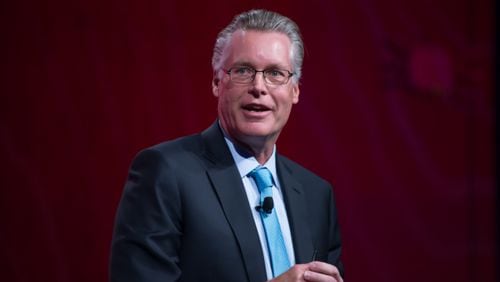2016 was a milestone year for Delta Air Lines and for Ed Bastian, who stepped into the CEO position at the company last year.
In the eight months since, Bastian has already tackled some big challenges.
He succeeds Richard Anderson, who retired from the CEO position at Delta effective May 2. Anderson remained executive chairman of the company's board of directors for only about five months before retiring from that post as well.
Before departing, Anderson managed to complete negotiations with the city of Atlanta on a new 20-year lease at Hartsfield-Jackson. He left for Bastian unfinished pilot labor negotiations, which finally led to a new contract approved Dec. 1.
But one of the biggest tests for Bastian was an operational meltdown in August.
"We had a couple of small bumps along the way," Bastian said during the company's annual investor day in mid-December. "Richard left me with a couple of challenges. We had the technology outage, which is on us, and we got through that okay."
Bastian publicly apologized for the outage, which he acknowledged was a computer vulnerability that had been left undetected.
But none of that was on the radar when Anderson announced Feb. 3, 2016 that he planned to retire, and Bastian was named his successor. Here’s the story from that day:
Delta CEO departing, successor named
Atlanta’s biggest airline — and one of its biggest private employers — soon will have a new leader.
Delta Air Lines said Wednesday that CEO Richard Anderson will retire on May 2 after a nearly nine-year tenure in which he led the company through a blockbuster merger and turned it into a financial star of the industry .
He’ll be succeeded by Ed Bastian, currently Delta’s president and No. 2 executive.
Anderson, 60, will stay tied to the airline as executive chairman of its board of directors. The succession appears aimed at reassuring shareholders and others that no big course changes loom, one analyst said.
“The people leading the airline continue to lead the airline, and that’s very important for continuity,” said Henry Harteveldt, of Atmosphere Research Group. “It’s important to the employees, and I think it provides reassurance to customers.”
Bastian, 58, has long been an heir apparent. A one-time executive at Pepsi-Cola, he’s been at Delta since 1998 save for a brief departure to be a top executive at a smaller Atlanta company in 2005.
He returned just a few months later and played key roles in Delta’s grueling trip through bankruptcy reorganization and its subsequent merger with Northwest Airlines, just after Anderson arrived in 2007.
Delta also said veteran executive Glen Hauenstein will be promoted to president and Gil West is being promoted to senior executive vice president and chief operating officer.
The succession plan “has been several years in the making and will keep Delta on top of the global industry,” Delta’s board chairman, Dan Carp, said in a written statement.
Atlanta Mayor Kasim Reed, who has in recent years built a close relationship with Anderson, called the outgoing CEO “one of the most important figures in the life of the city of Atlanta, certainly since I’ve been mayor.”
By managing Delta’s turnaround, Anderson “was essential to the health of the city of Atlanta, the region and the state of Georgia,” Reed said.
World’s biggest hub
Delta is by far the largest tenant at city-owned Hartsfield-Jackson Internati0nal Airport, where it has the biggest hub operation by a single airline anywhere in the world.
The company has some more than 27,000 employees based at the Atlanta hub, and its impact ripples throughout the metro economy.
Delta recently posted a $4.5 billion profit for 2015 and said it will distribute $1.5 billion in profit sharing to workers.
Anderson started his career as a Texas prosecutor before joining the airline industry, eventually rising to the CEO position at Northwest. He had left for a post with United Health Group when Delta tapped him as its post-bankruptcy CEO.
In addition to engineering the Northwest merger — which kicked off a major round of consolidation across the industry — Anderson made a series of unconventional moves including buying shares of foreign carriers and acquiring an oil refinery to gain more control over fuel costs.
Tenacious, unapologetic
Along the way, his tenacious and unapologetic approach to legal battles, political issues and international expansion gained attention — and raised eyebrows.
He angered some Georgia politicians with his criticism of so-called religious liberty legislation, leading to the demise of a state fuel tax credit for Delta.
Last year he pulled Delta out of the main airline industry trade association over policy disagreements.
After he butted heads with middle eastern carriers over government subsidies, the CEO of Qatar Airways said he wanted to debate Anderson, adding: “I will hang him on a wall.”
Bastian has had a much lower profile, but that may change. Tasks on the to-do list for Delta include negotiations on a new pilot labor deal, after pilots voted down a proposed contract last year.
And in Atlanta, Delta and the city are in the midst of negotiations on a new 20-year lease that will play a key role in a $6 billion expansion plan for Hartsfield-Jackson.
Reed said he expects to complete lease negotiations before Anderson leaves his position.
MORE:
Richard Anderson retires from Delta board, Frank Blake named chairman







